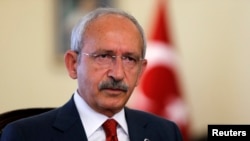The leader of Turkey's largest opposition party was reported on Thursday as saying he saw an early election as more likely than the formation of a coalition government, in comments adding to political uncertainty.
Prime Minister Ahmet Davutoglu needs to find a junior coalition partner after a June 7 election left his ruling AK Party without a parliamentary majority for the first time since it came to power in 2002.
The AKP and the Republican People's Party (CHP) are in coalition talks and an alliance between them is currently seen as the only likely option for a government, but CHP leader Kemal Kilicdaroglu voiced skepticism.
"I see the possibility of an early election as more likely. Well-intentioned steps have been taken for a coalition but if we look realistically there are various difficulties," he told the pro-government Yeni Safak newspaper in an interview.
President Tayyip Erdogan is seen as favoring early polls, an option that would give the AKP he founded a chance to win back a majority and revive his hopes of furnishing his post with the strong executive powers he seeks.
Kilicdaroglu, despite expressing doubt about a coalition’s formation, still views this as the best option for political stability.
He said a coalition would be a "very healthy" way out of the current uncertainty given that an early election was unlikely to give the AKP a mandate strong enough to deal with the country's problems.
Veteran CHP deputy and former party leader Deniz Baykal reportedly added to skepticism regarding a possible coalition on Thursday, saying that the AKP did not want to form a coalition and that an early election was likely in November.
"The AK Party does not want to form a government," IHA news agency quoted him as telling reporters. "The coalition talks are just theater. There will be an election in November."
A grand coalition between the center-right, Islamist-rooted AKP and the center-left, secular CHP would likely be fragile and factious. But it could help placate jittery foreign investors and revive attempts to settle a Kurdish rebellion in the southeast.





